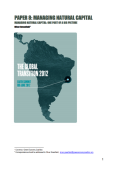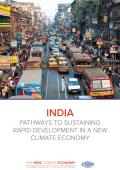
The natural world has a lot to teach us. Above all, it teaches about systems and cycles; that altering one component of a system, however small, can have wider implications within and beyond a given cycle. Human society, the planet and the economy are all systems and are all bound together in intricate relationships. Only when we begin to understand this bigger picture can we tackle the systemic problems facing us. This paper takes a short journey through planetary science to grasp some of the dimensions of those relationships, and poses a series of solutions for affecting the kind of systemic transformation that are urgently needed to ensure the health of the planet and of people. Economic theory (and common sense) explains that when something is valuable, and it is free, its use tends to approach infinity - this explains why trees, biodiversity, freshwater and atmospheric space for carbon are all being used ‘like there is no tomorrow’. It also assumes that when something is exhausted (or too expensive), a substitute is almost certain to be found.

Green development emphasizes co-development between economic and environmental dimensions, and is a people-centered sustainable development approach. Western China demands green development, and international experience could provide necessary, unique and important help and support for Western China to achieve its green development goals. This paper has made a comprehensive overall review and analysis of international experience in green development policy and its implementation, in particular, OECD countries’ (mostly Australia and Canada) experience have been analyzed following the major policy foci defined by the Task Force on Strategy and Policies on Environment and Development in Western China initiated by China Council for International Cooperation on Environment and Development (CCICED). Data and information were gathered from the field surveys and investigations, expert meetings, as well as literature review. The main sections include policy framework and road map establishment, implementation and performance assessment, co-development between economic development and environmental protection, as well as green employment and poverty alleviation.
The benefits of hydropower as a source of clean energy with low greenhouse gas emissions are in stark contrast with its negative local social and environmental impacts. This briefing paper discusses this contradiction and the rising importance of affordable clean energy from hydropower in emerging and developing economies. Since hydropower is back on the development agenda this momentum should be used to invest in more environmental and social friendly schemes.
This report serves as a starting point to address the calls from Rio+20 and the United Nations Environment Programme Governing Council to share the South’s various experiences and national-level initiatives for transitioning to sustainable and socially inclusive economies. Four unique national initiatives – all taking place in countries in the South, and at different stages of implementation - are highlighted: Ecological Civilization in China, Sufficiency Economy in Thailand, Green Economy in South Africa, and Living Well in Bolivia.
By emphasizing their common economic, environmental and social aspirations, as well as challenges and available resources, this report aims to benefit countries by sharing experiences that they may find relevant to their own particular challenges. In addition to providing concrete examples, such exchanges can empower countries to share and learn from home-grown responses to sustainable development challenges. In this report, sub-sections describing four national sustainable development approaches are drawn from contributions from the four project countries themselves.
